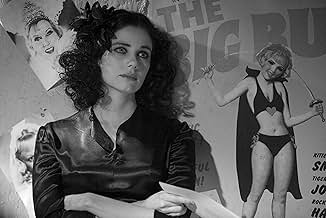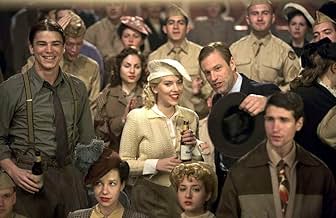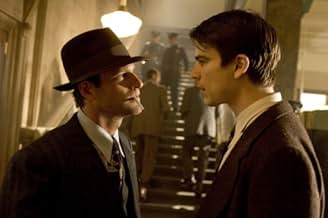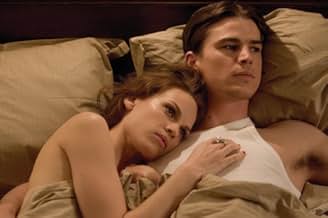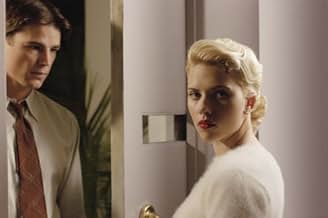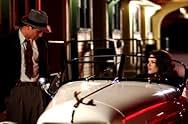Dois policiais veem suas vidas pessoais e profissionais desmoronarem após a investigação do assassinato de Elizabeth Short, a "Dália Negra".Dois policiais veem suas vidas pessoais e profissionais desmoronarem após a investigação do assassinato de Elizabeth Short, a "Dália Negra".Dois policiais veem suas vidas pessoais e profissionais desmoronarem após a investigação do assassinato de Elizabeth Short, a "Dália Negra".
- Direção
- Roteiristas
- Artistas
- Indicado a 1 Oscar
- 4 vitórias e 16 indicações no total
Angus MacInnes
- Capt. John Tierney
- (as Angus MacInnis)
- Direção
- Roteiristas
- Elenco e equipe completos
- Produção, bilheteria e muito mais no IMDbPro
Avaliações em destaque
De Palma's staged, theatrical style has always felt like an in-joke: an expressive homage (or sometimes a slap in the face) to the conventions of cinema. And in the case of his high- energy thrillers, the joke is funny and damned entertaining. But in the case of his dramas, De Palma constantly walks a thin line between evocative melodrama and camp (The wonderful "Carlito's Way," in my opinion, is the exception). And "The Black Dahlia" often steps over that line.
With a steady build-up of noir conventions, the film hearkens to the expressionistic film and acting styles of the 40's -- a style which can induce giggles in audiences raised on irony. And I can count a few musical swells, flamboyant acting choices and dramatic fade-outs which caused unwanted comic relief. Or did it? If there's one thing De Palma loves more than entertaining his audience, it's confounding them. How else do you explain the two-hour joke that was "Raising Cain"? (Although I, for one, found that particular joke damned funny).
You watch "Dahlia" with the distinct impression that De Palma is enjoying every minute of it. He's copying Wilder, Welles and, you guessed it, Hitchcock -- and he's having a blast doing it. So when Josh Hartnett's character pulls a full dinner setting (including the turkey) off a table and throws Scarlett Johansson down lustfully upon it, should we also smile and remember "Double Indemnity"? I guess it would help if you've seen "Double Indemnity."
That said, the film's biggest flaw is that it smiles at itself for so long that it leaves little time to wrap up the plot. The onslaught of last-reel revelations seems to exist only to give the actors more opportunity to relish in the delicious mood De Palma has created. We never really cared about the plot in the first place because De Palma didn't care about it either. He's more interested in the shadows, the thrills, the drama, the lurking killers, swelling music, lusty confrontations and blood splatters. And the plot points get lost somewhere in the mix. So who can blame us for glazing over when Hartnett finally starts to care about the mysteries rather than just being mystified by them? De Palma has painted such an odd, exciting picture (even when it turns to camp) that the audience would rather keep watching the elaborate set-ups than sit through the convoluted solutions.
But then again, what good is a joke without a satisfying punch line?
With a steady build-up of noir conventions, the film hearkens to the expressionistic film and acting styles of the 40's -- a style which can induce giggles in audiences raised on irony. And I can count a few musical swells, flamboyant acting choices and dramatic fade-outs which caused unwanted comic relief. Or did it? If there's one thing De Palma loves more than entertaining his audience, it's confounding them. How else do you explain the two-hour joke that was "Raising Cain"? (Although I, for one, found that particular joke damned funny).
You watch "Dahlia" with the distinct impression that De Palma is enjoying every minute of it. He's copying Wilder, Welles and, you guessed it, Hitchcock -- and he's having a blast doing it. So when Josh Hartnett's character pulls a full dinner setting (including the turkey) off a table and throws Scarlett Johansson down lustfully upon it, should we also smile and remember "Double Indemnity"? I guess it would help if you've seen "Double Indemnity."
That said, the film's biggest flaw is that it smiles at itself for so long that it leaves little time to wrap up the plot. The onslaught of last-reel revelations seems to exist only to give the actors more opportunity to relish in the delicious mood De Palma has created. We never really cared about the plot in the first place because De Palma didn't care about it either. He's more interested in the shadows, the thrills, the drama, the lurking killers, swelling music, lusty confrontations and blood splatters. And the plot points get lost somewhere in the mix. So who can blame us for glazing over when Hartnett finally starts to care about the mysteries rather than just being mystified by them? De Palma has painted such an odd, exciting picture (even when it turns to camp) that the audience would rather keep watching the elaborate set-ups than sit through the convoluted solutions.
But then again, what good is a joke without a satisfying punch line?
Dante Ferretti's set design beautifully evokes the 1940's; Vilmos Zsigmond's cinematography enhances the period look; and the voice-over narration has been pulled from film-noir classics. While Brian De Palma's "The Black Dahlia" has much of the look and feel of Curtis Hanson's 1997 "L.A. Confidential," that far superior film boasted better performances and a well-written screenplay. Although both films were based on James Ellroy novels and both had complicated, involved plots, the Hanson film came together with satisfying logic. Unfortunately, De Palma's movie is equally if not more complex and leaves a few threads dangling or at least badly frayed.
Although loosely based on a famous Hollywood murder, "The Black Dahlia" spends more time than necessary in establishing the three-way partnership, if not ménage, between Josh Hartnett, Scarlett Johansson, and Aaron Eckhart. The leisurely pace allows viewers to ponder the last time that they saw a film with so many double letters in the stars' names. The trailer, which has played in theaters for weeks, was misleading, and the actual murder and resulting investigation do not begin until well into the film after we have witnessed boxing scenes between the police investigators, Hartnett and Eckhart, and some three-way flirtations that do little to advance the proceedings.
The film only becomes interesting when the campy upper crust Linscott family enters. Hilary Swank as Madeleine Linscott is a deadly femme in black and as fatale as they come. Fiona Shaw as her mother shamelessly steals scenes and chews the banisters in her few minutes on screen, and John Kavanagh as Emmet Linscott adds to the family's quirky personality. An entire film could have been constructed around the Linscotts that would have been far more interesting than the Hartnett-Johansson-Eckhart romance. Scarlett has little to do but purse her luscious red lips and look desirable in tight blouses, which she does quite well. Josh is all squinty-eyed intensity and muscled charm, which he does quite well. Aaron tries for more, but goes a bit over the top; perhaps he would have been more comfortable playing a cousin of the Linscotts.
Although "The Black Dahlia" is not the worst way to spend two hours, the film's pedigree would lead viewers to expect more. Only a week after the less-disappointing "Hollywoodland," De Palma's take on another old Hollywood mystery should have been riveting. All of the essentials were there, except possibly a seasoned troop of stars, for another "L.A. Confidential." Unfortunately, what arrived was a nearly indecipherable mystery within a tedious love triangle that was wrapped in multi-million dollar production values.
Although loosely based on a famous Hollywood murder, "The Black Dahlia" spends more time than necessary in establishing the three-way partnership, if not ménage, between Josh Hartnett, Scarlett Johansson, and Aaron Eckhart. The leisurely pace allows viewers to ponder the last time that they saw a film with so many double letters in the stars' names. The trailer, which has played in theaters for weeks, was misleading, and the actual murder and resulting investigation do not begin until well into the film after we have witnessed boxing scenes between the police investigators, Hartnett and Eckhart, and some three-way flirtations that do little to advance the proceedings.
The film only becomes interesting when the campy upper crust Linscott family enters. Hilary Swank as Madeleine Linscott is a deadly femme in black and as fatale as they come. Fiona Shaw as her mother shamelessly steals scenes and chews the banisters in her few minutes on screen, and John Kavanagh as Emmet Linscott adds to the family's quirky personality. An entire film could have been constructed around the Linscotts that would have been far more interesting than the Hartnett-Johansson-Eckhart romance. Scarlett has little to do but purse her luscious red lips and look desirable in tight blouses, which she does quite well. Josh is all squinty-eyed intensity and muscled charm, which he does quite well. Aaron tries for more, but goes a bit over the top; perhaps he would have been more comfortable playing a cousin of the Linscotts.
Although "The Black Dahlia" is not the worst way to spend two hours, the film's pedigree would lead viewers to expect more. Only a week after the less-disappointing "Hollywoodland," De Palma's take on another old Hollywood mystery should have been riveting. All of the essentials were there, except possibly a seasoned troop of stars, for another "L.A. Confidential." Unfortunately, what arrived was a nearly indecipherable mystery within a tedious love triangle that was wrapped in multi-million dollar production values.
Now I like Brian DePalma, and I love Carrie, The Untouchables and Carlito's Way. Out of the films of his I've seen, The Black Dahlia is my least favourite in my view, though I was also rather disappointed in Scarface too.
I was really interested in its concept and the story seemed interesting. Also the film is very well made, with stylish cinematography and beautiful scenery, costumes, sets and makeup, DePalma's direction has occasional flashes of brilliance and the music was quite nice as well.
However, this is another case of style over substance. The script falls flat, with little idea of which direction to go, and the tone of the story is also uneven with some scenes disappointingly over-the top. The characters I felt indifferent to, and I also thought they were quite shallow and poorly explored, the pace is rather meandering and with exception of Fiona Shaw who's quite good the acting is bland. Also the ending I think is overdone.
All in all, interesting initially and while well made it is emotionally hollow and flat in its scripting and characterisation. 4/10 Bethany Cox
I was really interested in its concept and the story seemed interesting. Also the film is very well made, with stylish cinematography and beautiful scenery, costumes, sets and makeup, DePalma's direction has occasional flashes of brilliance and the music was quite nice as well.
However, this is another case of style over substance. The script falls flat, with little idea of which direction to go, and the tone of the story is also uneven with some scenes disappointingly over-the top. The characters I felt indifferent to, and I also thought they were quite shallow and poorly explored, the pace is rather meandering and with exception of Fiona Shaw who's quite good the acting is bland. Also the ending I think is overdone.
All in all, interesting initially and while well made it is emotionally hollow and flat in its scripting and characterisation. 4/10 Bethany Cox
Anybody expecting to get a great account of the Black Dahlia case, even fictional, will be disappointed going in to this movie. Of course, I knew that it was a fictionalization of the case, but I had no idea the movie would present its own evidence and draw its own conclusions.
But the main problem here is not the lack of factual detail, so much as the confusion of plot that surrounds and overwhelms the Black Dahlia case itself. So much plot and character and sideplots and backstory are built around the central characters that the case itself seems like a distraction. A key plot point and character motivator is the fascination of the two detectives with the murder, but this is never elaborated enough in the film, and we're left to half-heartedly guess at the character motivations.
The tone is never consistently campy, but when the camp arrives it overwhelms the story. A dinner scene between a suspect and her family had the crowd in stitches (the only scene during which the audience laughed). The problem is that the scene is valuable to the plot and should never have been played for laughs. Hitchcock or even Lynch could have shot the same scene, with the same events and dialogue, and made it menacing and creepy, which it needed to be to function in the mystery.
Other problems: De Palma uses the lesbian angle of the movie (never a part of the case) to full exploitative advantage, and the actresses seem unable to master to the expressive 1940s style acting that would have come naturally to even a marginal 40s star.
Although the film brings a clearcut finale rather than a vague puzzle, too many loose threads come together too neatly and rather than bringing the film to a satisfactory conclusion, it leaves you scratching your head, is this what I spent the last 2 hours waiting to hear? Overall, there is too much plot, too little character development and a wildly uneven tone. The movie has its moments but it's a blinding mess all together.
But the main problem here is not the lack of factual detail, so much as the confusion of plot that surrounds and overwhelms the Black Dahlia case itself. So much plot and character and sideplots and backstory are built around the central characters that the case itself seems like a distraction. A key plot point and character motivator is the fascination of the two detectives with the murder, but this is never elaborated enough in the film, and we're left to half-heartedly guess at the character motivations.
The tone is never consistently campy, but when the camp arrives it overwhelms the story. A dinner scene between a suspect and her family had the crowd in stitches (the only scene during which the audience laughed). The problem is that the scene is valuable to the plot and should never have been played for laughs. Hitchcock or even Lynch could have shot the same scene, with the same events and dialogue, and made it menacing and creepy, which it needed to be to function in the mystery.
Other problems: De Palma uses the lesbian angle of the movie (never a part of the case) to full exploitative advantage, and the actresses seem unable to master to the expressive 1940s style acting that would have come naturally to even a marginal 40s star.
Although the film brings a clearcut finale rather than a vague puzzle, too many loose threads come together too neatly and rather than bringing the film to a satisfactory conclusion, it leaves you scratching your head, is this what I spent the last 2 hours waiting to hear? Overall, there is too much plot, too little character development and a wildly uneven tone. The movie has its moments but it's a blinding mess all together.
I was disappointed in this film mainly because I love James Elroy's books and found that this film did not do it justice. The characters in the film became stereotypes or cardboard 40's characters. Scarlett Johannsen looked like a young Lana Turner on tranquilizers.........very little emotion, so much mumbling.............poor Hilary Swank was just too distracting in her black wig trying to be a 40's vamp ...........I guess we are not accustomed to seeing her that way and she evidently does not do well in sexy, seductive roles............Josh Hartnett did pretty well.........although the constant taking off of clothing of his different ladies seemed a bit tiresome......if I would have had this on video I would have fast forwarded the constant "clothes removal" scenes. James Ellroy also wrote LA Confidential and that was a masterpiece on film.........but of course, the actors were Russell Crowe, Kevin Spacey, Danny Divito, and many very well seasoned actors with a far above average script. Sorry to say that this film is not academy award material as LA Confidential was................Ellroy's stories can be told on film with good writing, competent acting, good casting, good screenplay and continuity. This was not present in The Black Dahlia. Actually, the girl who played The Black Dahlia was the most sensitive and sympathetic and portrayed her character excellently.
Você sabia?
- CuriosidadesWhen Dwight "Bucky" Bleichert goes searching through some photographs, you can see a real autopsy photo of Elizabeth Short.
- Erros de gravaçãoWhen Bucky Bleichert enters Sheryl Saddon's bedroom to get the suitcase, there is a postcard-sized picture of Bettie Page on the wall. Bettie Page did not start modeling until 1950.
- Citações
Emmet Linscott: What kind of name is Bleichert? Dutch?
Ofcr. Dwight "Bucky" Bleichert: German.
Emmet Linscott: Ah, a great people, the Germans. Hitler was a bit excessive. But mark my words that someday we'll regret not joining forces with him to fight the Reds.
- Trilhas sonorasIn the Mood
Written by Joe Garland (as Joseph C. Garland)
Used by Permission of Shapiro Bernstein & Co. Inc. (ASCAP)
Principais escolhas
Faça login para avaliar e ver a lista de recomendações personalizadas
Detalhes
- Data de lançamento
- Países de origem
- Idiomas
- Também conhecido como
- La Dalia Negra
- Locações de filme
- Empresas de produção
- Consulte mais créditos da empresa na IMDbPro
Bilheteria
- Orçamento
- US$ 50.000.000 (estimativa)
- Faturamento bruto nos EUA e Canadá
- US$ 22.545.080
- Fim de semana de estreia nos EUA e Canadá
- US$ 10.005.895
- 17 de set. de 2006
- Faturamento bruto mundial
- US$ 49.332.692
- Tempo de duração2 horas 1 minuto
- Cor
- Mixagem de som
- Proporção
- 2.35 : 1
Contribua para esta página
Sugerir uma alteração ou adicionar conteúdo ausente







